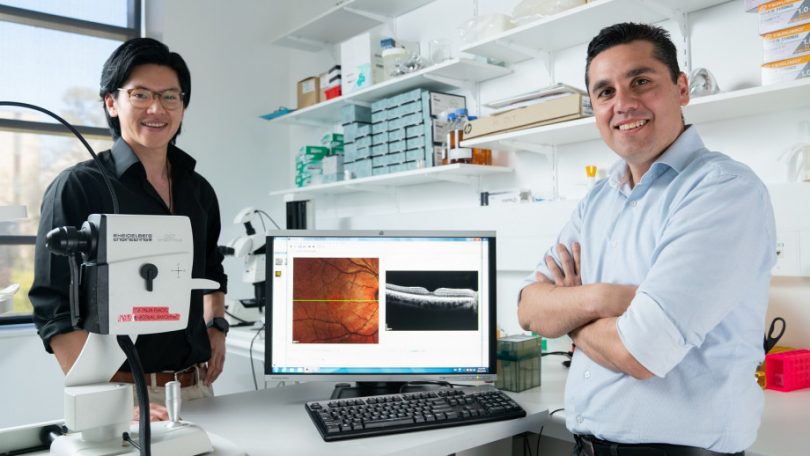
Dr Joshua Chu-Tan (left) and Associate Professor Riccardo Natoli from Clear Vision Research at The Australian National University (ANU). Photo: Tracey Nearmy, ANU.
All that strenuous running and star-jumping and push-upping, but somehow, the bathroom scales still bear bad news. Just imagine if keeping fit and healthy involved nothing more than remembering to pop a pill every morning with your full-cream coffee.
It’s the elixir that humankind has lusted after since the dawn of time, but some local researchers say they might be on the way to cracking the code.
Researchers from the ANU have investigated what happens in our bodies immediately after exercise and discovered some unique molecular signals.
They say these signals could hold the key to developing a supplement capable of administering the health benefits of exercise, particularly to patients incapable of physical activity.
These molecular messages are sent to our brain and possibly our eyes immediately after we exercise, raising the question of their impact on retinal health and the central nervous system and eye diseases such as age-related macular degeneration (AMD).

Don’t say goodbye to the gym just yet. Photo: Club Lime.
Head of Clear Vision Research at ANU Associate Professor Riccardo Natoli says the molecules could be hijacked, recoded and “bottled up” in a pill and taken like a vitamin.
“The beneficial messages being sent to the central nervous system during exercise are packaged up in what are known as ‘lipid particles’. We are essentially prescribing the molecular message of exercise to those who physically aren’t able to,” he said.
Professor Natoli’s team thinks that communication between the muscles and the retina starts to wane as we age, with the same effect as bad internet. He says that similar to taking supplements, the goal is to provide genetic or molecular supplementation that combats natural ageing.
“Our goal is to figure out what these molecules are communicating to the body and how they’re communicating.”
New ANU research has examined existing literature into the effects of exercise on the central nervous system and eyes. Specifically, the researchers set out to discover what impact exercise has on the retina – the light-sensing part of the eye – and whether exercise can help maintain good eyesight as we age.

The pill would be intended only for patients who have restricted movement. Image: Goodwin Villages.
Dr Joshua Chu-Tan, also from the ANU Clear Vision Research Lab, says further research is needed to understand how these molecular signals, which are sent from the rest of the body when we exercise, actually reach our brain and eyes, but that preliminary research has delivered “promising” results.
“We know exercise is good for our eyesight, but to what extent is still unknown. Our aim is to understand the benefits of exercise at the molecular level and how it is beneficial for the central nervous system and the retina,” Dr Chu-Tan said.
“One of the main goals of doing this review was to determine what’s going on inside the body after we exercise that gives us the benefits of exercise, and why physical activity is so good for our brain and eyes.”
It is thought the futuristic therapy could one day help patients suffering from neurological diseases such as Alzheimer’s and Parkinson’s.
“We know from looking at diseases like Alzheimer’s and Parkinson’s that if you exercise in a particular fashion, you can potentially stimulate neuronal activity,” Dr Chu-Tan said.
“That hasn’t really been looked at in the retina at the level we’re thinking of. We want to understand the molecular messages that underpin the benefits of exercise.”
If it sounds too good to be true, it is for most of us.
The researchers say the supplement would be intended only for patients who have restricted movement that renders them unable to exercise. It is not intended for the general public.
“We can’t possibly package all the effects of exercise into a single pill, there are too many benefits that stretch throughout the entire body beyond what we could ‘prescribe’, and that’s not the goal,” Dr Chu-Tan said.
Original Article published by James Coleman on Riotact.








